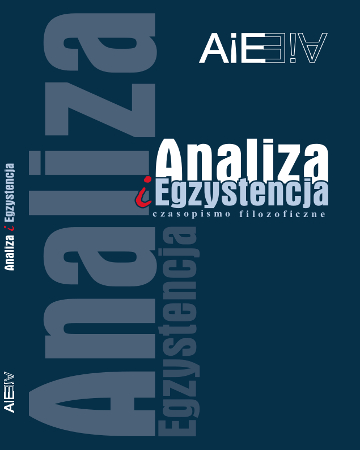
ISSN: 1734-9923
eISSN: 2300-7621
OAI
DOI: 10.18276/aie.2017.39-02





Lista wydań /
39 (2017)
Rational vs. Mystical Readings of Aristotle’s Nous Poietikos Introduction to the Subject and Overview of Central Positions
| Autorzy: |
Sonia
Kamińska
Uniwersytet Jagielloński, Instytut Filozofii |
| Słowa kluczowe: | nous poietikos mystical and rational readings Aristotle psychology God/Deity immortality intellectual soul unio mystica |
| Data publikacji całości: | 2017 |
| Liczba stron: | 17 (19-35) |
Abstrakt
In my paper, I will give an overview of the readings of nous poietikos, the active
intellect from De Anima. Sadly, Aristotle describes it in a cryptic way, which resulted
in many different theories. I will order them by introducing a division into “mystical”
and “rational”. The mystical ones are rooted in a view that nous poietikos does not
belong to particular human beings, but is identical with Deity or a divine sphere.
According to the rational readings it is our cognitive tool and through its activity
we can learn about the Deity and emulate it. The mystics are: Eudemus, Avicenna,
Averroes, from the newer philosophers E. Zeller and from the contemporary ones
– V. Caston. The rationalists are: Theophrastus, Thomas Aquinas, the XIXth century
Aristotelian revival and from the contemporary thinkers – A. Kosman.
Pobierz plik
Plik artykułu
Bibliografia
| 1. | Aristotle (2003). Dzieła wszystkie. Warszawa: Wydawnictwo Naukowe PWN. |
| 2. | Aristotle (2017). On the Soul. Retrieved from: http://classics.mit.edu/Aristotle/ |
| 3. | soul.3.iii.html (10.01.2017). |
| 4. | Aristotle (1963). On the Soul. Trans. J.A. Smith. In: W.D. Ross (ed.), The Works |
| 5. | of Aristotle, vol. 3. Oxford: Oxford University Press. |
| 6. | Brentano, F. (1978). Aristotle and his World View. Trans. R. George, R.M. Chisholm. |
| 7. | Berkeley: University of California Press. |
| 8. | Brentano, F. (1911a). Aristoteles Lehre vom Ursprung des menschlichen Geistes. |
| 9. | Leipzig: Quelle & Meyer. |
| 10. | Brentano, F. (1911b). Aristoteles und seine Weltanschauung. Leipzig. |
| 11. | Brentano, F. (1977). The Psychology of Aristotle. Trans. R. George. Berkeley: |
| 12. | University of California Press. |
| 13. | Caston,V. (1999). Aristotle’s Two Intellects: A Modest Proposal. Phronesis, 44, |
| 14. | 199–227. |
| 15. | Gerson, L.P. (2004). The Unity of Intellect in Aristotle’s De Anima. Phronesis, |
| 16. | 4 (XLIX), 348–373. |
| 17. | Kamińska, S. (2014a). Franz Brentano and His Competing World Views. Philosopher’s |
| 18. | Choice Between Science and Religion. Studia Religiologica, 4 (47), |
| 19. | 285–294. |
| 20. | Kamińska, S. (2014b). The Alleged Activity of Active Intellect – A Wild Goose |
| 21. | Chase or a Puzzle to be Solved. Zagadnienia Filozoficzne w Nauce, 54, 79–126. |
| 22. | Kamińska, S. (2012). What Can Grow from the Divine Seed? The Divinity of Human |
| 23. | Beings According to Aristotle. Studia Religiologica, 3 (45), 173–182. |
| 24. | Kosman L.A. (1992). What Does the Maker Mind Make? In: M.C. Nussbaum, A. Oksenberg |
| 25. | Rorty (eds.), Essays on Aristotle’s De Anima (pp. 334–358). Oxford: |
| 26. | Oxford University Press. |
| 27. | Macfarlane, P., Polansky, R. (2009). God, the Divine, and Νοῦς in Relation to the |
| 28. | “De Anima”. In: G. Van Riel, P. Destrée (eds.), Ancient Perspectives on Aristotle’s |
| 29. | “De Anima” (pp. 107–123). Leuven: Leuven University Press, |
| 30. | Modrak, D.K.W. (1991). The Nous-Body Problem in Aristotle. The Review of Metaphysics, |
| 31. | 4, 755–774. |
| 32. | Reale, G. (1990). A History of Ancient Philosophy: The Schools of the Imperial Age. |
| 33. | Trans. J.R. Catan. New York: SUNY Press. |
| 34. | Sorabji, R. (2006). Self, Ancient and Modern Insights about Individuality, Life, and |
| 35. | Death. Chicago: University of Chicago University Press. |
| 36. | Thomas Aquinas (1998). Selected Writings. London: Penguin Books Limited. |
| 37. | Thomas Aquinas (1999). Sententia libri De anima, Thomas Aquinas: a Commentary |
| 38. | on Aristotle’s De Anima. Trans. R. Pasnau. New Haven–London: Yale Library |
| 39. | of Medieval Philosophy, Yale University Press. |
| 40. | Twardowski, K. (2009). Die Unsterblichkeitsfrage (The Problem of Immortality). |
| 41. | Manuscript lecture notes, Spring Semester 1894/5, Vienna University, |
| 42. | pp. 227. Online at http://www.elv-akt.net. Now edited by Michał Sepioło as |
| 43. | Die Unsterblichkeitsfrage, Warszawa: Wydawnictwo WFiS UW, Twardowski |
| 44. | Archives, Biblioteka IFiS PAN. |
| 45. | Twardowski, K. (1895a). Filozofia współczesna o nieśmiertelności duszy. Przełom, |
| 46. | 1 (14), 427–438. |
| 47. | Twardowski, K. (1895b). Metafizyka duszy. Przełom, 1 (15) 1895, 467–480. |
| 48. | Zeller, E. (1886). Outlines of the History of Greek Philosophy. Trans. S.F. Alleyne, |
| 49. | E. Abbott. London: Longmans Green Co. |
| 50. | Wisnovsky, R. (2005). Avicenna and Avicennian Tradition. In: P. Adamson, |
| 51. | R.C. Taylor (eds.), Cambridge Companion to Arabic Philosophy (pp. 92–136). |
| 52. | Cambridge: Cambridge University Press. |